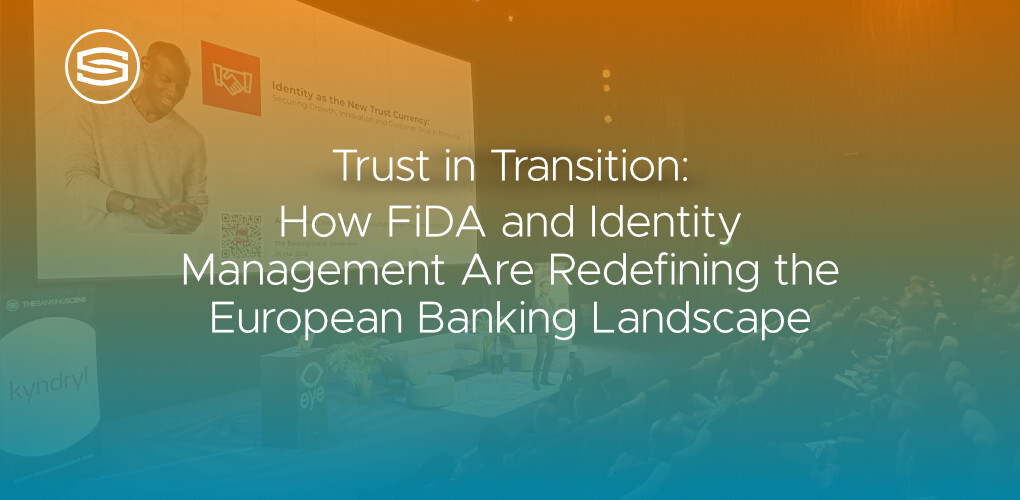
Insights & Opinions
Trust in Transition: How FiDA and Identity Management Are Redefining the European Banking Landscape
Mon, 31 Mar 2025


At The Banking Scene Conference 2025 Amsterdam, two powerful narratives converged: the evolution of financial data access (FiDA) as a regulatory force and the rising strategic importance of identity in the age of fraud, AI, and hyper-personalisation. Together, they sketched a vision of banking where trust, not just technology, will determine who thrives in the next era of finance. But let’s be clear: it isn’t a clear path, and it will require more dialogue for a common understanding between regulators, banks and their stakeholders.
Identity as Trust Currency: Adam Preis on IAM's Strategic Rise
In a compelling keynote, Adam Preis, Head of Product and Solutions Marketing of Ping Identity, reframed the conversation on digital security. Identity and access management (IAM) is emerging as a strategic asset that is no longer confined to the back office. As Preis argued, IAM now sits at the intersection of compliance, customer experience, and competitiveness.
“Identity is effectively the new perimeter,” he said, warning that only 54% of decision-makers trust the integrity of identity in their digital infrastructure.
His message was clear: in a landscape shaped by PSD3, FiDA, and DORA, modern IAM isn’t just about securing access — it’s about enabling business outcomes. From mitigating AI-driven fraud to powering personalised, consent-driven journeys, IAM is becoming the foundation for banks to rebuild trust and differentiate themselves.
Preis introduced the concept of “verified trust”: mutual authentication, not just of customers but also of banks and third parties. This becomes essential in a future where third-party access, embedded finance, and cross-border data sharing are the norm. His call to action: treat identity as a board-level priority, invest in orchestration, and embrace flexible architectures that adapt as threats and regulations evolve.
FiDA: A Framework Full of Promise — and Peril
If Preis made the case for infrastructure and the trust toolings, the panel with Nicola Breyer, International Open Finance Expert, and Edwin Sanders, Tribe Lead Innovation at Rabobank, tackled the front-end of transformation: how data sharing can, or should, work in Europe. Moderated with nuance by yours truly, the discussion explored FiDA’s ambition and its unintended consequences.
Edwin Sanders raised concerns rooted in pragmatism. He questioned whether FiDA, as it currently stands, aligns with real-world market needs. Regulation without demand, he warned, risks creating a compliance-first mindset that stifles innovation, collaboration and new business opportunities.
“If you have a compliance mindset, you implement it the most minimalistic way you can, with the most scrubby experience,” he said, drawing parallels with PSD2’s underwhelming uptake in its early years.
Sanders advocated a market-driven approach: realistic timelines, sustainable incentives, and alignment with consumer expectations. He warned against a scenario where data sovereignty is compromised by third-country tech giants better positioned to leverage open data than European institutions themselves.
The Mechanics and the Messiness of FiDA
Far from another PSD2-style directive, FiDA is a regulation — once enacted, it becomes binding law across all 27 EU member states simultaneously, leaving less room for national discretion. Its scope is sweeping: from retail banking to mortgages, pensions, insurance products, and potentially even SME finance.
Breyer explained the phased nature of FiDA’s rollout. While early stages focus on foundational financial products like deposits, credit and savings, later stages, notably post-2028, may tackle more complex domains such as life insurance and occupational pensions. However, many of these are still paper-based and fragmented in various member states, a reality that may delay implementation.
Critically, FiDA introduces industry-governed schemes, a notable shift from the overly-specified PSD2 regime. These schemes will define technical standards, data models, and even monetisation models. In theory, it is a more collaborative and adaptive regulatory framework. But Breyer warned that without proper stakeholder engagement and incentives, the market may default to box-ticking.
“What’s missing is a constructive dialogue around the how,” she noted. “We’re in the Trilogue stage now, but we haven’t had the industry-wide conversation on use cases, consumer value, or technical feasibility.”
What Comes Next: The Tricky Road Through Trilogues
Breyer outlined that FiDA is now entering the Trilogue phase — the complex negotiation between the European Parliament, Council, and Commission to finalise the regulation. Each institution holds differing views, particularly on pricing, implementation timelines, and scope (e.g., whether occupational pensions are in or out). A final agreement is expected no earlier than Q3 2025 under the Danish presidency of the Council.
One of the most hotly debated topics is remuneration. While FiDA allows for data sharing “at cost,” it leaves room for industry-defined monetisation frameworks. Breyer warned that if the industry isn’t incentivised to ensure high-quality APIs and data granularity, the outcome may mirror the PSD2 experience: poor service levels, disjointed UX, and minimal adoption.
She also emphasised the risk of fragmentation. Without common technical frameworks (building on Berlin Group standards, for example), each country may develop divergent implementations — the exact opposite of FiDA’s objective to create a pan-European data economy.
A Pan-European Perspective: From Amsterdam to Luxembourg
The discussion in Amsterdam was a powerful echo of a similar conversation held 2 months earlier at The Banking Scene Conference 2025 Luxembourg. There too, industry leaders debated whether FiDA could deliver on its promise without overburdening financial institutions or alienating less digital consumers.
The Luxembourg panel highlighted many of the same frictions: unclear business models, asymmetric obligations between banks and third parties, and the looming gap in financial inclusion. It added a sharper call for outcome-based regulation, a regulatory mindset focused not only on opening data, but on the quality of service, financial well-being, and consumer empowerment it enables.
Taken together, these two panels reveal a pan-European industry that is not resisting change, but asking for a smarter, more coordinated way to deliver it. Regulation is no longer about opening doors — it’s about ensuring someone wants to walk through them.
Humanising the Digital Shift
One of the most poignant takeaways came not from regulation or technology, but from humanity. Edwin explained:
“In the physical world, customer interactions are naturally personalised. When engaging digitally, we term this 'hyperpersonalisation'. In the physical world, we simply call this humanity.”
It’s a timely reminder. Both IAM and FiDA are ultimately about people — their identities, their data, their trust. And in banking, where emotion and money are tightly linked, delivering digital experiences that feel human is not a luxury; it’s a necessity.
Conclusion: Aligning Strategy with Trust
As Europe enters a period of intense regulatory transformation, banks must make strategic choices. FiDA, PSD3, and DORA are not just compliance checklists — they are frameworks that will reward those who build infrastructure for trust, flexibility, and long-term relevance.
IAM, as Adam Preis made clear, is one such foundation. But infrastructure alone isn’t enough. As Breyer and Sanders discussed, true innovation happens when regulation meets market demand, when data sharing delivers tangible value, and when banks don’t just expose data — they act on it responsibly.
The message from Amsterdam — echoed in Luxembourg — is loud and clear: trust is no longer a by-product of banking. It is the product.
It will be in interesting how Europe is about to move the needle when it comes to regulation and financial data access.
Exciting times ahead!
Join us at our flagship conference in Brussels on May 22, where we will continue to dig deeper into all of the above themes and more!


